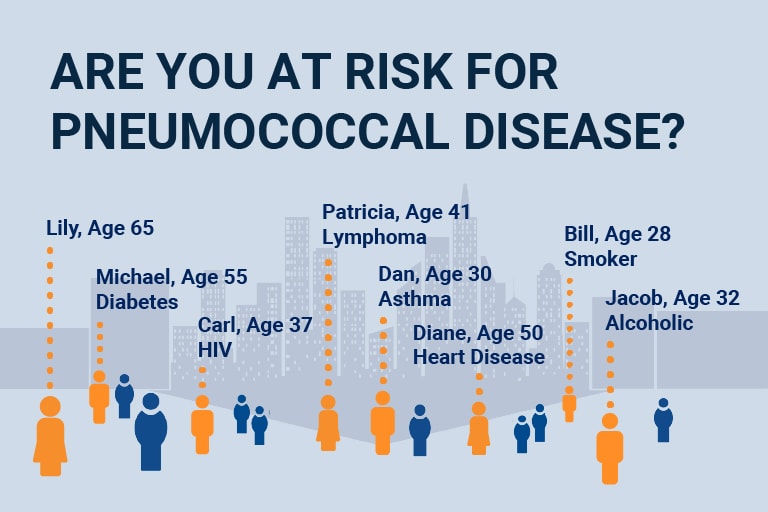People who have certain chronic health conditions or other risk factors should get vaccinated against pneumococcal disease.
Pneumococcal disease is a serious infection that causes pneumonia, meningitis, and bloodstream infection, as well as other less severe illnesses.
Pneumococcal pneumonia is a leading bacterial cause of hospitalized pneumonia in the US. Adults age 65 years and older and people with certain medical conditions or other risk factors are at increased risk of serious outcomes or death from pneumococcal pneumonia.
Fewer adults get pneumococcal meningitis or bloodstream infection (bacteremia), but the mortality rate for these infections is high, even with proper treatment. Pneumococcal meningitis kills about 1 in 6 older patients and bacteremia kills about 1 in 8 adults who are infected. Both conditions can also result in lifelong disability including deafness, brain damage, and limb amputation.
People of all ages are at increased risk for pneumococcal disease if they have any of the following conditions or risk factors:
- Chronic health conditions such as heart disease, lung disease, diabetes, kidney disease, or liver disease
- Conditions that weaken the immune system, such as sickle cell disease, HIV/AIDS, cancer, or a damaged or missing spleen
- Cochlear implants or cerebrospinal fluid (CSF) leaks
- Alcoholism
- Smoke cigarettes
Who Should Be Vaccinated?
Children age 6-18 years who have certain chronic conditions or other factors that increase their risk for pneumococcal disease may need PCV15, PCV20, or pneumococcal polysaccharide vaccine (PPSV23), depending on their pneumococcal vaccination history.
Adults age 19-64 years with risk factors and all adults age 65 years and older who did not previously receive a pneumococcal conjugate vaccine or whose vaccination history is unknown should receive 1 dose of pneumococcal conjugate vaccine (PCV21, PCV20, or PCV15).
When PCV15 is used, it should be followed by a dose of PPSV23. Patients should talk with a healthcare professional about appropriate vaccination based on their situation.
CDC offers additional guidance for adults who previously received either PPSV23 only or those who received the PCV13 conjugate vaccine.
Adults age 50 years and older should talk with a healthcare professional to make sure they are up to date with pneumococcal vaccination.
Updated October 2024
Source: Centers for Disease Control and Prevention
Related Resources
Are You at Risk for Pneumococcal Disease?
Infographic on adults who are at risk for pneumococcal disease
Top 5 Reasons for Adults to Get Vaccinated for Pneumococcal Disease
Fact sheet on the importance of preventing pneumococcal disease in adults



